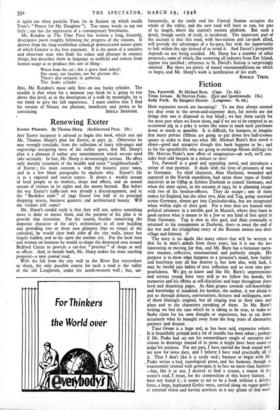Renewing Exeter
Exeter Phoenix. By Thomas Sharp. (Architectural Press. 10s.)
ANY Exeter ratepayer is advised to begin this book, which sets out Mr. Thomas Sharp's plan for Exeter, at page 35. Otherwise he may wrongly conclude, from the collection of fancy title-pages and engravings occupying most of the earlier space, that Mr. Sharp's plan is a pleasant if rather any entertainment which no-one need take seriously. In fact, Mr. Sharp is devastatingly serious. He offers only sketchy treatment of the middle and outer " neighbourhoods " of Exeter ; his main concern is with the historic inner town, and in a few blunt paragraphs he explains why. Exeter's life is as a regional and tourist centre. It draws a weekly stream of local people to its markets, shops and offices, and an annual stream of visitors to its sights and the moors beyond. But before the war Exeter's traffic-jam was already a discouragement, and in the " Baedeker raids " of 1942 Exeter lost half of its principal shopping streets, business quarters and architectural beauty. Will the visitors still come?
Mr. Sharp's candid reply is that they will not, unless something more is done to attract them, and the purpose of his plan is to provide that attraction. For the tourist, besides conserving the domestic character of the city's architecture in all new building and providing two or three new glimpses (but no vistas) of the cathedral, he would clear both sides of the city walls, intact but largely h;c1den, and so lay open the ancient city. For the local man and woman on business he would re-shape the destroyed area around Bedford Circus to provide a car-less " precinct " of shops as well as offices. And, to benefit both, Mr. Sharp makes his most startling proposal—a new central road.
With the fall from the city wall to the River Exe everywhere so sharp, the only possible course for such a road is the valley of the old Longbrook, under the north-western wall ; but, un- fortunately, at the castle end the Central Station occupies the whole of the valley, and the new road will have to run, for part of its length, above the station's eastern platform. But such a detail, though costly of itself, is incidental. The important part of the account is that this road, with bus-station and car-park allied, will provide the advantages of a by-pass, but with the opportunity to halt within the city instead of to avoid it. And Exeter's prosperity depends on not being avoided. Mr. Sharp has a number of other proposals, some of which, like removing all industry from Exe Island, appear less justified ; reference to St. David's Station is surprisingly omitted. But there are plenty of sound recommendations on which to begin, and Mr. Sharp's work is justification of his craft.
RONALD TRESS.


























 Previous page
Previous page